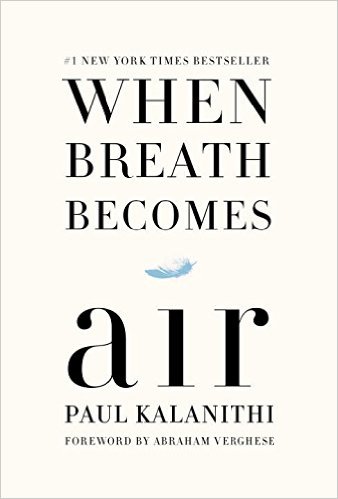When Breath Becomes Air
by Paul Kalanithi
Paul Kalanithi’s memoir When Breath Becomes Air (2016, Random House), tells the devastating story of a brilliant young doctor who was diagnosed with cancer just as he was finishing his training to be a neurosurgeon. When, after some months, his cancer proved resistant to medical treatments, Kalinithi used his remaining time to write When Breath Becomes Air, and asked his family to find a way to publish it after his death. As of the end of September, 2016, When Breath Becomes Air has been on the New York Times Bestseller list for over thirty-five weeks.
The book is written in two sections. In “Part I: In Perfect Health I Begin,” Kalanithi shares stories of his youth in Kingman, Arizona, including some entertaining tales about growing up in the Mojave desert: “Only after living out in the desert for a while did we realize that some ‘country facts,’ like the existence of the jackalope, had been deliberately created to confuse city folks and amuse the locals.” The desert landscape, Kalanithi records, had a magical quality: “Out here, dust devils swirled up from nothing, blurring your vision, then disappearing. Spaces stretched on, then fell away in the distance.” Kalanithi also explains in “Part I” that as a youngster he had decided against becoming a doctor due to his physician father’s long and frequent absences from home.
Regarding a profession, it didn’t matter to Mrs. Kalanithi what her son chose to study at college as long as he made it into college. Her mission was to be certain her three boys were college ready even though they lived in a small desert town. To guarantee their college entrance, Mrs. Kalanithi found a “college prep reading list” and began handing out books to her sons. As a result, Kalanithi writes, “Books became my closest confidants, finely ground lenses providing new views of the world.” When he entered Stanford University, Kalanithi chose English Literature as his major while taking biology courses concurrently.
In the study of literature Kalanithi hoped to discover what it meant to lead a meaningful life, and how death figured into this understanding. By the time he had finished his master’s thesis he realized he didn’t fit in an English department, and sought counsel from an advisor about how to enter medical school. “Stepping back, I realized that I was merely confirming what I already knew….It was only in practicing medicine that I could pursue a serious biological philosophy. Moral speculation was puny compared to moral action…. I was going to Yale for medical school.”
“Part II: Cease Not Till Death” is chiefly about Kalanithi’s diagnosis of metastatic lung cancer — one that he and his physician wife, Lucy, recognized as they lay side-by-side on a hospital bed scrolling through CT scan images of Kalanithi’s lungs, liver and spine. Instantly, life changed for them. The challenges of medical school and marriage problems paled in comparison to the struggle that appeared, specter-like, on the CT images.
The diagnosis of cancer occurred in Kalanithi’s seventh year of medical training, his final year as a resident neurosurgeon. “One chapter of my life seemed to have ended; perhaps the whole book was closing. Instead of being the pastoral figure aiding a life transition, I found myself the sheep, lost and confused….I faced the same existential quandaries my patients faced….Standing at the crossroads where I should have been able to see and follow the footsteps of countless patients I had treated over the years, I saw instead only a blank, a harsh, vacant, gleaming white desert, as if a sandstorm had erased all trace of familiarity.”
One of the surprising messages that Kalanithi brings to When Breath Becomes Air is his conviction that suffering has value. In considering the possibility of having a child even though Kalanithi’s death was imminent, Lucy asked her husband whether or not having to say goodbye to his child would make his death more painful. Kalanithi answered: “Wouldn’t it be great if it did?….Lucy and I both felt that life wasn’t about avoiding suffering….We decided to have a child. We would carry on living instead of dying.”
Kalanithi was raised in a devout Christian home, but during his college years became an atheist. As one who wrestled with the definition of a meaningful life even in his youth, science, not Christianity, seemed to Kalanithi to supply the best possible answers to his questions. During his illness he began once again to scrutinize his thoughts about the existence of God. “[To] make science the arbiter of metaphysics is to banish not only God from the world, but also love, hate, meaning….I returned to the central values of Christianity –sacrifice, redemption, forgiveness — because I found them so compelling.”
The choice to return to the Christian faith brought peace and purpose to Kalanithi as he faced his last days. The book follows Kalanithi’s journey to the end of his life, and includes an epilogue written by his wife.
When Breath Becomes Air by Paul Kalanithi is a glorious and gritty volume. Kalanithi has recorded a moving tale of the arduous demands that terminal illness brings upon a family. Yet astoundingly, Kalanithi’s cancer, which might have resulted in despair, culminated instead in the happy occurrence of a baby being born; and the difficult reality of coping with the punishing effects of cancer, which could have turned Paul and Lucy Kalanithi’s life into a prison of sorrow and pain, rather became for them a portal to family joy. When Breath Becomes Air is a remarkable book. I hope you will read it and share it with someone you love.
.

